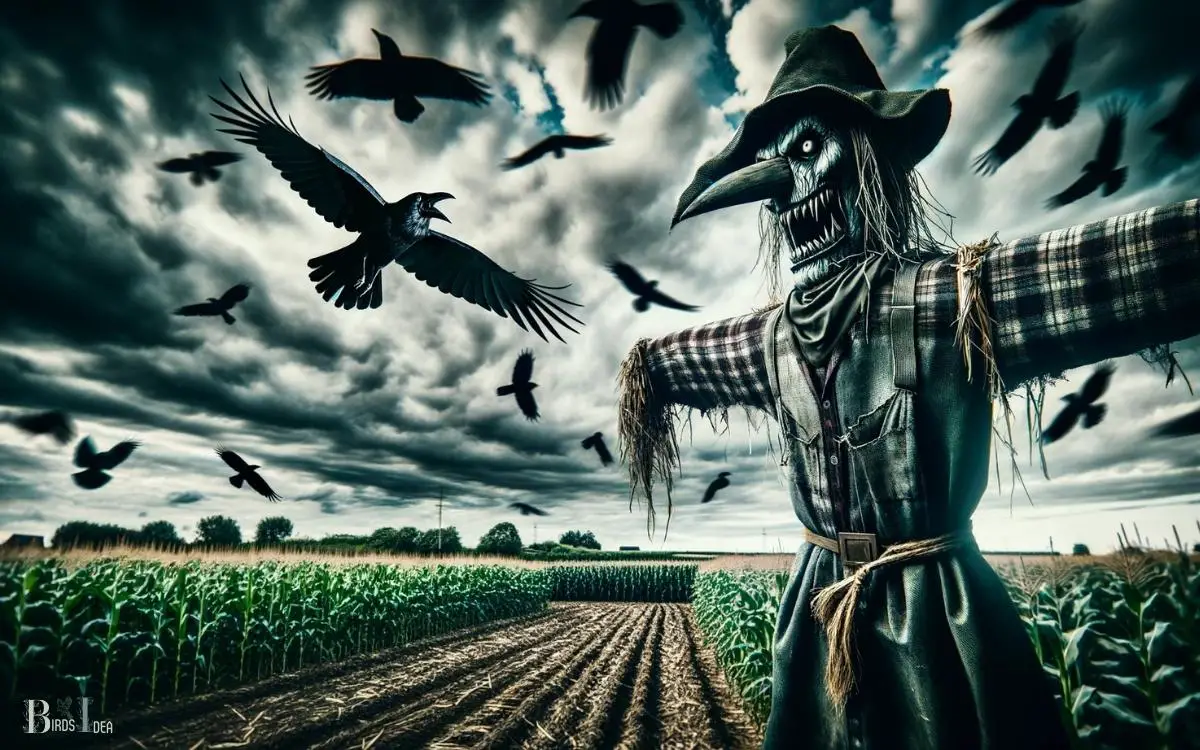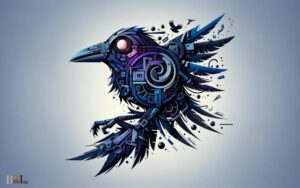What Are Crows Afraid Of? Predators, Loud Noises, Large Animals!
Crows, highly intelligent birds, exhibit fear towards several specific threats, including predators such as hawks and owls, human-made objects like scarecrows and dead crows, loud noises, and large animals.
Utilizing their keen sense of awareness, crows often avoid these dangers to ensure their survival.
Crows are known for their sharp intelligence and adaptability, but there are certain things that can trigger their instinctual fear responses:
- Predators: Hawks, owls, and other larger birds of prey are natural predators of crows.
- Scare tactics: Human effigies (scarecrows), fake dead crows, and reflective objects are used to deter crows.
- Loud noises: Unexpected loud sounds can startle crows, causing them to flee.
- Large animals or unfamiliar presence: The approach of any large animals or an unusual presence can make crows nervous.
Despite their bold nature, crows maintain a cautious approach to potential threats, always ready to take flight to the safety of the skies when danger lurks below.

Key Takeaway
Natural Predators
Crows are naturally wary of potential predators, such as owls, hawks, and eagles, due to their aerial hunting capabilities.
These birds of prey pose a significant threat to crows, as they are agile and swift in their attacks from the sky.
The crow’s fear of these predators is deeply ingrained in their behavior, prompting them to take evasive action when they detect the presence of these aerial hunters.
This natural instinct for self-preservation is essential for the survival of crows, allowing them to thrive and maintain their freedom in the wild.
Understanding the dynamics of these natural predators helps shed light on the intricacies of the crow’s behavior and the measures they take to ensure their safety and liberty in their environment.
Loud Noises
The fear of loud noises is a common instinct among many animals, including crows.
When faced with sudden, loud sounds, crows often exhibit signs of distress and discomfort.
Understanding the impact of loud noises on crows can help in developing effective scare tactics and noise deterrents to manage their presence in specific areas.
Crow Scare Tactics
- Crows can be deterred by utilizing loud noises as a scare tactic. These intelligent birds are sensitive to sudden, loud sounds, often associating them with potential threats.
- This sensitivity makes loud noises an effective method for deterring crows from unwanted areas such as gardens, farms, or urban spaces.
- Common techniques include using noisemakers, banging pots and pans, or employing devices that emit loud, startling sounds.
By employing these scare tactics, individuals can encourage crows to seek alternative locations, thus reducing potential conflicts and damage caused by these birds.
It’s important to note that while loud noises can be an effective deterrent, it’s essential to use them responsibly and consider the well-being of other wildlife and the surrounding community.
Impact of Loud Noises
An article determiner is a determiner (such as ‘a’ or ‘an’) used before a noun in an article.
Can you please provide an article determiner so I can proceed with the first sentence for the subtopic ‘Impact of Loud Noises (Loud Noises)’?
- Loud noises can have a significant impact on crows and their behavior. Crows are highly sensitive to loud sounds, which can startle and distress them.
- The sudden and unexpected nature of loud noises can disrupt their environment and cause them to feel threatened or unsafe.
- This can lead to crows avoiding areas where loud noises are frequent, impacting their natural habitats and foraging patterns.
- Prolonged exposure to loud noises can cause stress and anxiety in crows, affecting their overall well-being and potentially leading to negative consequences for their populations.
Understanding and minimizing the impact of loud noises on crows is crucial for promoting their freedom and preserving their natural behaviors.
Noise Deterrents for Crows
Impact of loud noises on crows can be mitigated through the implementation of effective noise deterrents.
Crows are highly sensitive to loud noises, which can disrupt their natural behaviors and cause distress.
Implementing noise deterrents can therefore help to manage crow populations and reduce potential conflicts with humans.
Below is a table outlining various noise deterrents for crows:
| Noise Deterrent | Description |
|---|---|
| Scarecrows | Human-like figures that can be placed in fields to deter crows |
| Sonic Repellents | Devices that emit loud, high-pitched sounds to scare off crows |
| Pyrotechnics | Use of loud explosive devices to create a scare effect |
| Ultrasonic Devices | Emit high-frequency sounds that are unpleasant for crows |
Unexpected Movements
Sudden movements can trigger fear responses in crows, leading them to become cautious and wary of their surroundings.
- Crows are highly alert creatures, and unexpected movements can startle them, causing them to perceive the source of the movement as a potential threat.
- This natural wariness serves as a survival mechanism, helping them avoid potential danger in their environment.
- When crows sense unexpected movements, they may exhibit skittish behavior, quickly flying away or vocalizing alarm calls to alert other crows.
- This heightened awareness of their surroundings enables crows to remain vigilant and responsive to potential threats, enhancing their chances of survival in the wild.
Understanding how unexpected movements affect crows can help individuals coexist harmoniously with these intelligent and freedom-loving birds.
Humans
When it comes to crows, humans can elicit fear and caution through their presence and actions, often impacting the birds’ behavior and level of wariness.
Crows have been known to perceive humans as potential threats and adjust their behavior accordingly.
Here are some reasons why crows may exhibit fear or caution in the presence of humans:
- Aggressive behavior: Crows may fear humans due to aggressive actions such as chasing or attempting to harm them.
- Habitat destruction: The destruction of crow habitats by humans can lead to fear and wariness in these birds.
- Noise pollution: Human-generated noise can startle and disturb crows, leading to increased fear and caution.
- Hunting and trapping: The hunting or trapping of crows by humans can instill fear and caution in these intelligent birds.
Crows’ fear of humans is a natural response to perceived threats, and understanding this can help foster coexistence and mutual respect.
Larger Birds
Larger birds, such as hawks and eagles, can further exacerbate the fear and caution exhibited by crows in response to potential threats from humans.
Crows are highly vigilant creatures, and the presence of larger predatory birds triggers a heightened sense of alarm in them.
The sight of a hawk or an eagle soaring overhead sends the crows into a frenzy of cawing and frantic flight, as they perceive these raptors as a direct threat to their safety.
This fear response is deeply ingrained in their survival instincts, as larger birds of prey pose a significant danger to crows and their young.
Consequently, the presence of hawks and eagles in the vicinity can significantly impact the behavior and movements of crows, causing them to be even more cautious and wary of their surroundings.
Unfamiliar Objects
When it comes to unfamiliar objects, crows tend to be wary of shiny and reflective items that catch their attention.
Additionally, loud or sudden noises can startle them, causing them to avoid areas where such sounds occur.
Furthermore, crows are also cautious around moving or unpredictable items, as they prefer to stay away from potential threats or sources of disturbance.
Shiny and Reflective Objects
Fascinated by their attraction to shiny and reflective objects, crows demonstrate a keen interest in unfamiliar items.
This behavior is rooted in their innate curiosity and intelligence, leading them to investigate novel and intriguing items in their environment.
When encountering shiny or reflective objects, crows exhibit the following behaviors:
- Pecking and nudging the object to test its texture and durability.
- Carrying the object to a different location for further examination.
- Vocalizing and cawing to alert other crows of their discovery.
- Engaging in playful interactions with the object, showcasing their inquisitive nature.
This fascination with shiny and reflective objects highlights the cognitive complexity and adaptability of crows, as they seek to understand and interact with unfamiliar stimuli in their surroundings.
Such behavior sheds light on their ability to thrive in diverse environments. Moving forward, it is important to explore how crows respond to loud or sudden noises.
Loud or Sudden Noises
Crows, known for their fascination with shiny and reflective objects, also demonstrate distinct reactions to loud or sudden noises, particularly those associated with unfamiliar objects.
When faced with unfamiliar loud noises, crows often exhibit cautious behavior, displaying a heightened sense of awareness and wariness.
This reaction is likely rooted in their instinct for self-preservation and protection against potential threats in their environment.
Sensory Responses of Crows to Unfamiliar Auditory Stimuli:
| Unfamiliar Loud Noises | Crow’s Reaction |
|---|---|
| Sudden bang or clang | Cautious behavior, heightened awareness |
| Unfamiliar object emitting loud sound | Wariness and cautious approach |
Crows, by nature, value their freedom and autonomy. Consequently, when encountering unfamiliar loud noises, they tend to assess the situation carefully before deciding their next course of action. This behavior underscores their intelligence and adaptability in navigating their surroundings.
Moving or Unpredictable Items
Exposure to moving or unpredictable items elicits a cautious response from crows, reflecting their instinctual vigilance and adaptability in the face of unfamiliar objects.
Crows are naturally wary of things that they cannot easily categorize or understand, and it is this wariness that has contributed to their survival as a species.
When faced with moving or unpredictable items, crows tend to exhibit the following behaviors:
- Increased vocalizations and alarm calls
- Maintaining a safe distance from the object
- Vigilant observation and assessment
- Potential avoidance or retreat
Crows’ ability to assess and respond to unfamiliar objects underscores their intelligence and adaptability.
Their cautious approach to moving or unpredictable items serves as a testament to their desire for freedom and safety in their environment.
What Scares Crows Away?
Crows are intelligent birds, and deterring them can be a bit challenging.
However, there are several methods that people use to scare crows away:
- Predator Decoys: Placing fake predators like owls or hawks in the area can deter crows. Crows are wary of potential threats, and these decoys can create a sense of danger.
- Shiny Objects: Crows are attracted to shiny objects, but they can also be scared away by them. Hanging reflective items like CDs, aluminum foil strips, or old DVDs in the area can create flashes of light that may scare the crows.
- Scarecrows: While traditional scarecrows may not be as effective against crows due to their intelligence, some people have reported success with more dynamic and lifelike scarecrow designs.
- Noise Devices: Crows are sensitive to loud and unexpected noises. Using devices that produce sharp sounds, such as gas cannons, can startle and scare them away.
- Water Sprinklers: Crows don’t like being wet. Installing motion-activated sprinklers in the area can surprise them and make the environment less appealing.
- Netting: Covering crops or areas with lightweight netting can prevent crows from accessing the area and protect your plants.
- Remove Food Sources: If crows are attracted to an area because of a food source, removing or securing the food can help discourage them.
It’s essential to note that crows are intelligent and adaptable, so they may become accustomed to certain scare tactics over time. Combining several methods or changing them periodically can increase their effectiveness.
Local regulations may apply to certain scare tactics, so it’s a good idea to check and ensure that you are in compliance with any relevant laws or guidelines.
What Do Crows Hate?
Crows are intelligent and opportunistic birds, and while it might be an exaggeration to say they “hate” specific things, there are certain things that they may find unpleasant or deterrent.
Here are some factors that might discourage crows:
- Shiny or Reflective Objects: Crows are known to dislike bright and reflective surfaces. Hanging shiny objects like CDs, aluminum foil, or reflective tape may help deter them.
- Unpredictable Noises: Crows are startled by sudden and loud noises. Using devices that emit unexpected sounds, such as wind chimes, clanging pots, or even predator calls, can make the area less inviting for crows.
- Predator Presence: Crows are wary of predators. Installing decoys or models of predators, such as owls or hawks, may make crows think twice about approaching the area.
- Water Sprinklers: Crows generally dislike water, so motion-activated sprinklers can be effective in deterring them.
- Scarecrows with Movement: Traditional scarecrows may not be very effective against crows due to their intelligence. However, scarecrows with moving parts, like flapping clothing or rotating arms, may be more successful.
- Certain Scents: Some people claim that certain scents, like peppermint or garlic, can deter crows. Consider using these scents around areas you want to protect.
- Ultrasonic Devices: There are ultrasonic devices designed to emit sounds that are unpleasant to crows but are often inaudible to humans. These devices can help deter crows without disturbing people.
It’s important to note that while these methods may work to some extent, crows are highly adaptable, and their behavior can vary.
Combining multiple deterrents and periodically changing tactics can be more effective in the long run.
Local regulations may restrict the use of certain deterrents, so it’s essential to be aware of and comply with any applicable laws in your area.
Conclusion
Crows are afraid of natural predators, loud noises, unexpected movements, humans, larger birds, and unfamiliar objects.
While some may argue that crows are intelligent and adaptable creatures, it is important to note that they still exhibit fear towards certain stimuli.
By understanding the factors that cause fear in crows, it is possible to mitigate their impact and coexist with these intelligent birds in urban and natural environments.






